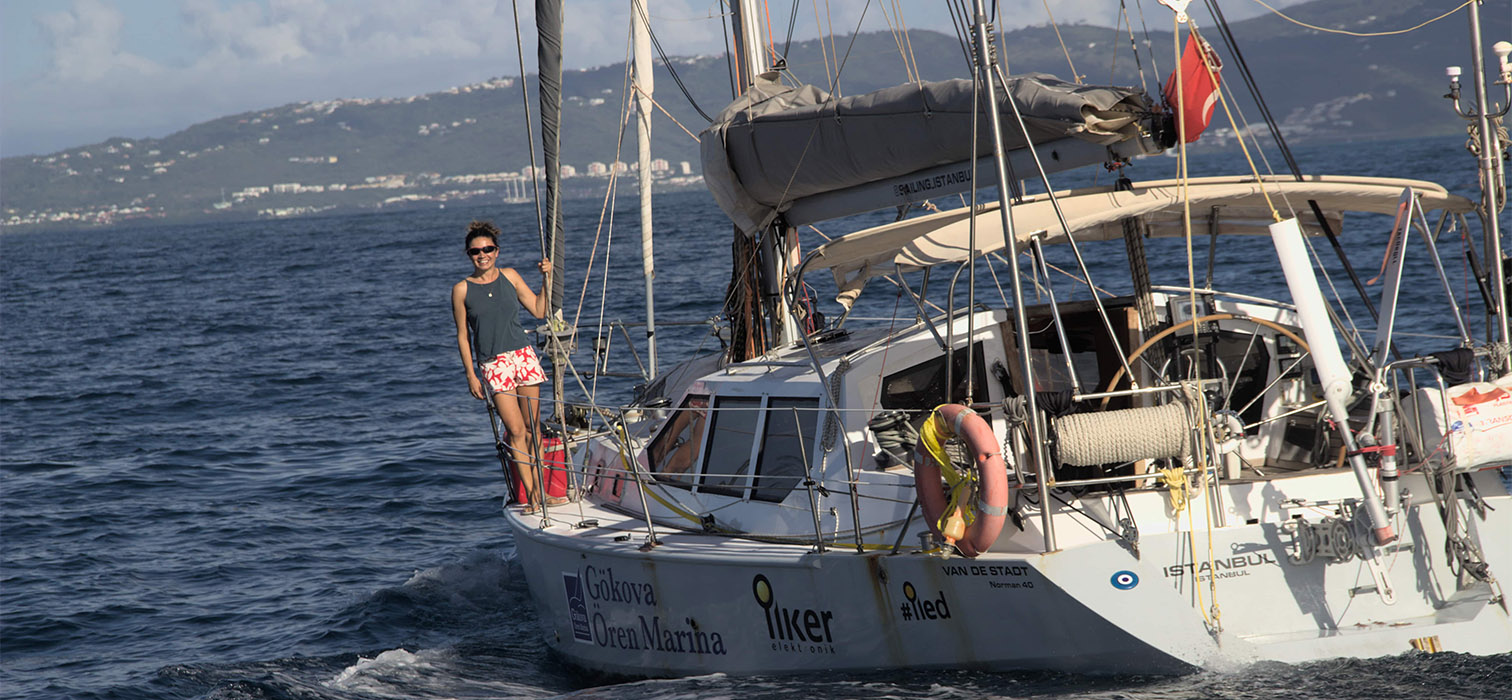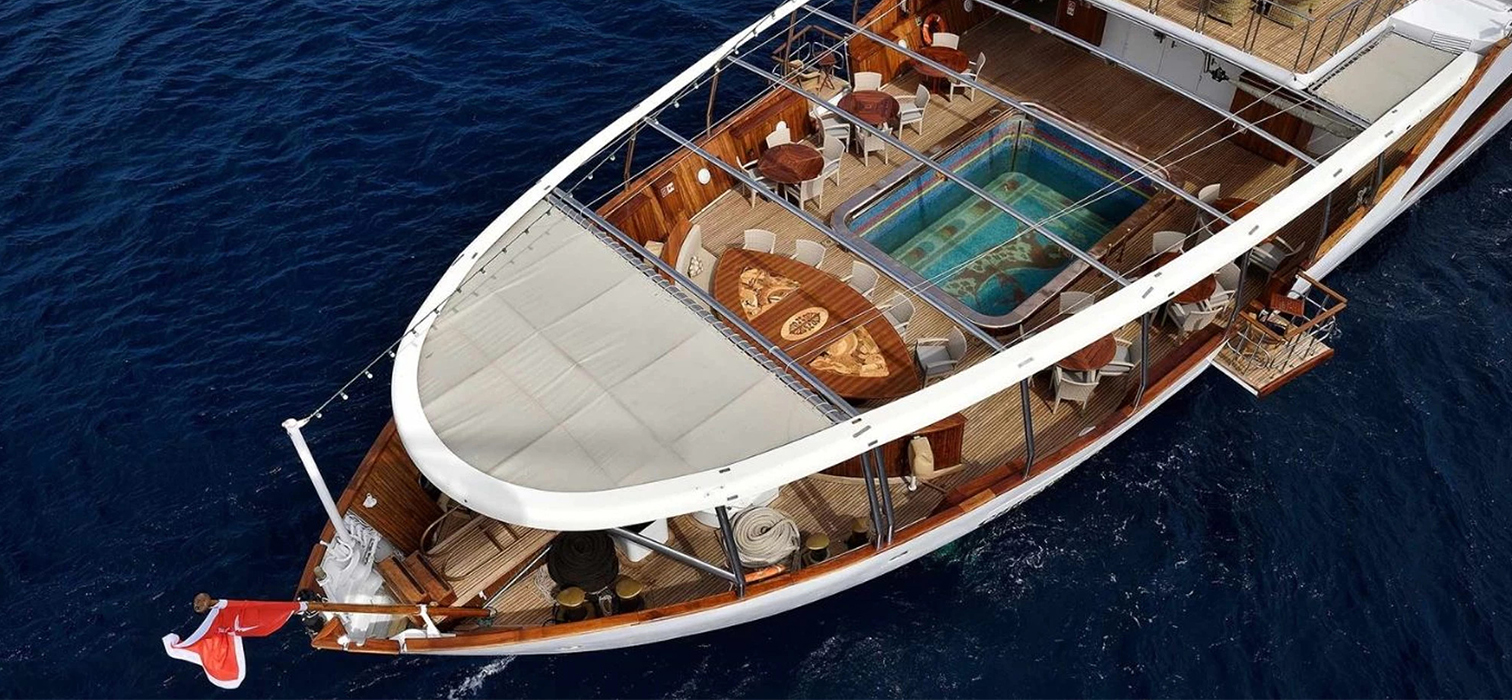Başak Mireli: The First Turkish Woman to Solo-Cross the Atlantic

Başak Mireli, the pioneering Turkish woman sailor who has accomplished the remarkable feat of crossing the Atlantic Ocean solo, has left an indelible mark on both her personal journey and the realm of Turkish sailing.
Sailing is a discipline where one must yield entirely to the whims of nature, in a way, surrendering to its formidable forces. Solo sailing elevates this challenge to an even more profound level, requiring not just physical endurance but also exceptional mental fortitude. It is often regarded as the pinnacle of sophistication within the sport. Having long admired solo sailors—particularly since I first learned about the Vendee Globe race, where competitors circumnavigate the globe alone, unaided, and without pause—I found it exhilarating to interview Başak Mireli. She stands as one of Turkey’s few esteemed solo sailing athletes.
Since the day she was born, Başak Mireli’s life has been intricately connected with the sea, a bond that persisted except during her years of study at METU. Her childhood boat trips with her family in Yalova laid the foundation for her future in yacht racing. As she grew older, her passion for solitary sea journeys led her to the realm of solo sailing, with each voyage extending in duration and depth. Driven by the experience and bravery garnered from her extensive solo excursions, Mireli accomplished the remarkable feat of crossing the Atlantic alone, thereby earning the distinguished title of “The First Turkish Woman to Solo-Cross the Atlantic.”
This solo Atlantic crossing marked not only a significant achievement but also the onset of a new chapter in Başak Mireli’s life, the duration of which remained uncertain to her. Following her Atlantic crossing, Mireli was reunited with her husband, Ömer Öcel, in Martinique—a reunion after their separation in Cape Verde, the departure point of her solo voyage. Together, they embarked on the South American leg of their world tour aboard their 12-meter sailing vessel named Istanbul. Currently, Başak Mireli and Ömer Öcel are navigating the Panama-San Blas Islands to ride out the hurricane season.

You grew up in a family with a deep connection to the sea. Could you share some insights about those formative years?
My parents spent their youth in Yalova, and one can only imagine how enchanting Yalova-Çınarcık was during my childhood, with its stunningly beautiful sea. They began their maritime adventures with boats and later transitioned to a more immersive boating life in Istanbul. Although our family never ventured beyond the Marmara Sea by boat, we enjoyed countless memorable coastal sailing experiences together. It was during this time that I discovered how boat life is not merely about sailing but also about fostering social connections and experiencing the joy of exploring new places and meeting new people.
It seems you were distanced from the sea only during your university years. How did you cope with your yearning for the sea during that period?
When I moved to Ankara to attend METU, I felt as though I was a fish out of water. The separation from the sea, my family, and friends was challenging, and adjusting to a completely different urban environment was difficult. Perhaps, I wasn’t very socially inclined at that time.
Fortunately, METU offered a vibrant array of social clubs that helped me break out of my shell. For me, the essence of being at sea lies in its connection with nature. I sought a similar experience in the mountains and thus joined the DKSK – Mountaineering and Short Sports Club. DKSK is a dedicated organization that offers professional mountaineering training, and I spent my weekends immersing myself in camping and mountain activities.
You have participated in team sailing races for many years. It is evident that solo long-distance sailing introduces a new dimension, where psychological resilience becomes as crucial as physical endurance. What motivated you to embark on solo sailing?
I would like to clarify that my solo sailing endeavors were not conducted within the competitive racing framework. Until the Turkish Sailing Federation introduced the solo category within the Turkish Tour Record Trial system, solo racing in the yacht category was not an option in Turkey, and it still remains so. Alongside my participation in yacht racing, I developed a passion for solitary sailing. As time progressed, the duration of my solo voyages gradually extended.

Can you elaborate on the emotions you experience when you are sailing alone, isolated in the vast expanse of the sea?
Sailing alone evokes a complex array of emotions. There is certainly an element of fear and anxiety, but the heightened awareness and the sharpening of one’s senses offer a profound sense of enjoyment. As physical exhaustion mounts and sleep deprivation begins to take its toll, these feelings become even more pronounced. This is where the psychological aspect becomes significant. For me, one of the most gratifying aspects of solo sailing is maintaining a level of awareness that ensures my emotions, no matter how intense, do not interfere with my decision-making processes.
“Our greatest fear is not so much the prospect of inclement weather, but rather the absence of wind altogether.”
What was your first long-distance solo sailing experience? Can you describe that journey and highlight the most challenging aspect for you?
My initial long-distance solo sailing endeavor was the Sailing Federation Marmara Sea Qualification Course. This course spans approximately 300 miles, navigating various points from Kalamış Bay to the Dardanelles. It is particularly demanding due to the heavy maritime traffic in the Marmara Sea. Completing this course without the assistance of a motorized vessel posed a significant challenge. What should have been a three to four-day voyage took me nine days to finish, primarily due to an exceptionally windless period. The sea was so still that not a leaf stirred in the Marmara. There were instances where I remained stationary for hours, occasionally up to 12 hours, with the sails raised and the boat not making any progress.
In sailing, people often believe that adverse weather conditions are the most challenging aspect. However, the true difficulty often lies in the complete absence of wind. When there is no breeze, idle sails, booms, and ropes begin to sway and produce unsettling noises as they bang against each other. This creates a disconcerting sensation, as if the boat might suddenly fall apart.

The risks of solo travel are well-documented, but what are the positive aspects?
Solo sailing reveals the best in me. The world of sailing is immense, with a continuous learning curve that perpetually introduces new experiences. When alone at sea, you rely entirely on your accumulated knowledge and experience, striving to perform at your best. While mistakes are inevitable, there is a profound sense of pride and fulfillment upon successfully completing your journey, knowing that you have intimately engaged with the natural world.
The longer you spend alone, the more rapidly you undergo a transformation that is hard to experience in everyday life. One of the most rewarding aspects of this transformation is the heightened sensitivity of your senses. Your hearing becomes extraordinarily acute, as it is the sole means of perceiving what occurs on the boat while you sleep. Your brain processes information with greater selectivity, allowing you to disconnect from daily concerns and focus solely on yourself.
Beyond enhancing your sailing skills, what has solo sailing contributed to your life?
In fact, it might be more fitting to reframe this question to consider what sailing has given me overall. Particularly during long-distance voyages, as you traverse different geographies, weather patterns, and sea conditions, you are constantly adapting to new environments, both physically and mentally. This continual adaptation involves testing and expanding your existing knowledge. Through this ongoing process, you undergo a gradual transformation. For instance, the rapid pace of change cultivates a greater sense of calm and reduces reactivity. Experiencing this alone at sea intensifies the process, making it a profound and enriching journey.

You had to abandon the Tour of Turkey Record Trial due to a technical failure. It’s an experience to end an attempt you had meticulously prepared for in such a short time. What did this experience teach you?
During my preparation for the Tour of Turkey Record Trial, I was heavily reliant on electronic support. Together with the Simrad team, we ensured that the entire electronic system was backed up. These systems and alarms were intended to assist me, especially while I was asleep. Although I did not encounter issues with the electronics themselves, a problem with the power supply rendered them unusable. This situation underscored the necessity of preparing for solo sailing as if I were entirely on my own.
The lessons learned from this voyage were invaluable for my Atlantic crossing. Regardless of whether I encountered system issues during the Atlantic crossing, I understood that I might not always have the energy to rely on electronics, particularly the autopilot. I realized the importance of trusting in my sails and in my own abilities, and to continue moving forward despite any breakdowns. Consequently, I prepared with this mindset, finding reassurance simply in the presence of the sun.

After your solo voyages, you and your husband embarked on a round-the-world journey aboard your sailboat. You commenced this voyage in a particularly significant manner by crossing the Atlantic solo. Can you share your experience of this journey?
The solo Atlantic crossing had been a key element of our plans from the outset. We had meticulously prepared the boat for this endeavor, ensuring that all sailing equipment and other aspects were in optimal condition. Following our Mediterranean cruise and passage through Gibraltar, we had the opportunity to test and refine these preparations based on my specific needs. In December 2022, we parted ways at Mindelo Port in the Cape Verde Islands.
Reflecting on it now, I realize that our separation was somewhat traumatic. It was a stressful situation for both of us, with Ömer bearing the brunt of the responsibility as the more cautious party. My initial days at sea were challenging, marked by rough weather and large waves between the Azores and Cape Verde. Once I had settled the boat and ensured everything was in order, I began to relax. By then, Ömer had arrived in Martinique, one of the Caribbean Islands. My Atlantic crossing took 24 days, and being alone at sea for such an extended period was an extraordinary experience. The memories remain as vivid as if they happened just yesterday.
The Boat is a Complex Ecosystem in Itself
How did you come to the decision to embark on a round-the-world voyage?
My journey into sailing began at a young age, and after university, I competed in yacht racing while also engaging in long-distance cruising. When I met Ömer, we discovered a shared passion for the sea and boat life. We also had a mutual love for travel, exploration, and meeting new people. For us, traveling by boat was the most fulfilling way to pursue these interests. Thus, we began the search for a boat suitable for our grand adventure and gradually turned our plans into reality.
Before setting sail, there is a strong desire to ensure that everything is perfectly prepared. This mindset, while ideal, means that the preparation phase can be lengthy. Despite the challenges we faced during this period, we remained undeterred. Our world tour project, initially delayed due to Covid, came to fruition in 2022, and our journey westward continues.

When and where did you begin your sailing journey?
We conducted all of our preparations in Gökova-Ören and embarked on our voyage from Gökova, which is our cherished starting point. In July 2022, five boats departed from Ören, and we sailed together to Kalymnos Island in Greece. After a delightful week spent with friends, we had alleviated the stress of our preparations and continued on our journey.
Where have you traveled so far, and where are you currently?
We had intended to make our Mediterranean crossing as swift as possible, and we adhered to this plan as closely as we could. Following our time in Greece, we sailed to Malta, which remains one of our most memorable stops. From Malta, we proceeded to Sardinia and then navigated along the Spanish coast to Morocco, specifically Tangier. After departing Gibraltar, we made our way directly to the Canary Islands. As this was the last opportunity to stock up on supplies, we replenished our spare materials and food reserves there.
After departing from the Canary Islands, our final stop on the eastern coast of the Atlantic was the Cape Verde Islands, with Mindelo standing out as one of our favorite locations. Following our Atlantic crossing, we reunited in Martinique and explored the Eastern Caribbean Islands throughout the season. We then proceeded to Trinidad to seek refuge from the hurricane season and to perform necessary boat maintenance. During our second season in the Caribbean, we completed a full circuit, heading north. Our journey took us to the US Virgin Islands, Puerto Rico, the Dominican Republic, Cuba, and Mexico before arriving in Panama. Currently, we are spending the hurricane season in the San Blas Islands of Panama.
Is there a division of labor on the boat, or do you handle everything yourselves?
The boat operates as a complex ecosystem, with its own systems for generating energy, producing water, and harnessing wind power for movement. Additionally, it serves as our home and primary living space. Everything we require for our sustenance relies on intricate technical systems. Consequently, the list of tasks is extensive. Both of us must be proficient in understanding and managing all systems, particularly in emergencies. Given the impossibility for one person to handle every responsibility in daily life, we adhere to a strict division of labor. This approach not only streamlines our daily routines but also enhances our functionality within the confined space. For instance, I handle the engine maintenance while Ömer takes charge of sail maintenance and rigging.
How do you finance your travels?
When we departed from Turkey, we left our jobs behind, as neither of us had the option to work remotely in our respective fields. Additionally, as our journey progressed, the time differences made remote work increasingly impractical. We initially funded our travels with a portion of our savings, but those resources eventually depleted. We now support ourselves through our YouTube channel, Sailing Istanbul, as well as the encouragement and assistance from our family and followers. Recently, we have also been hosting tourists in our bow cabin while we are in the San Blas Islands.
Which location has left the greatest impression on you among those you have visited so far?
Cuba, alongside Malta and Mindelo, stands out as a particularly impressive destination. Experiencing certain places by boat offers a unique perspective. For instance, in Malta, we anchored in the heart of Valletta’s old city and spent 10 days navigating from one side of this enchanting city to the other with our boat. We also explored other beautiful parts of Malta at our leisure, something we might not have fully experienced had we traveled by plane and stayed in a hotel.
When do you plan to conclude your round-the-world journey, or do you have a specific end date in mind?
Our enjoyment lies in traveling indefinitely and without constraints, which is why we do not adhere to a fixed timeline. Our schedule is guided by sailing seasons and the safe periods for various regions. In mid-September, we plan to leave our boat in Panama and meet Ali Can Sürekli and his vessel, PeliCan, in Uruguay. Together, we will embark on a remarkable 3,000-mile voyage to Cape Horn, an adventure expected to take approximately four months.




